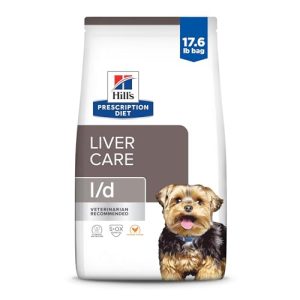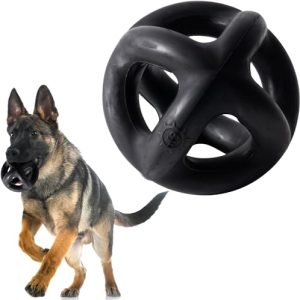Choosing the right food for your German Shepherd is more important than you might think. Your dog’s health, energy, and happiness depend on what you feed them every day.
But with so many options out there, how do you know which dog food is really good for your German Shepherd? This guide will help you understand exactly what your furry friend needs to stay strong and vibrant. Keep reading, because making the right choice could change your dog’s life—and yours—forever.
Nutritional Needs Of German Shepherds
Feeding your German Shepherd the right food is more than just filling their bowl. Their nutritional needs are unique and crucial for their health, energy, and longevity. Understanding these needs helps you choose the best dog food that supports their active lifestyle and strong body.
Nutrient Balance For Optimal Health
Your German Shepherd requires a balanced mix of proteins, fats, and carbohydrates. Protein supports muscle development and repair, which is vital for their active nature. Healthy fats provide energy and keep their coat shiny, while carbohydrates offer a steady energy supply.
Think about the last time your dog seemed sluggish. Could it have been due to missing nutrients? A dog food rich in quality protein sources like chicken or lamb and moderate fats from fish oil can make a big difference.
Essential Vitamins And Minerals
Vitamins and minerals play a key role in your dog’s immune system and overall well-being. German Shepherds benefit from foods rich in vitamins A, E, and B-complex, which support vision, skin health, and metabolism. Minerals like calcium and phosphorus are crucial for strong bones and teeth.
Have you noticed your dog limping or struggling to jump? This might indicate a need for better mineral intake. Choosing a dog food fortified with these nutrients helps keep your Shepherd agile and strong.
Special Considerations: Joint And Digestive Health
German Shepherds are prone to joint issues such as hip dysplasia. Including glucosamine and chondroitin in their diet can support joint health and reduce discomfort. Additionally, a diet with prebiotics and probiotics promotes good digestion and nutrient absorption.
Imagine your dog’s relief when joint pain decreases and digestion improves. Selecting a dog food tailored to these needs can enhance your dog’s quality of life significantly.

Credit: www.petsmart.ca
Key Ingredients For Optimal Health
Choosing the right dog food for your German Shepherd means focusing on ingredients that support their strength, energy, and overall well-being. Your dog’s diet should include components that fuel their active lifestyle and maintain their health at every stage. Let’s look closely at the key ingredients you need to check for in your dog’s food to keep your German Shepherd thriving.
Protein Sources
Protein is the building block for your German Shepherd’s muscles and tissues. Look for high-quality animal proteins like chicken, beef, lamb, or fish listed as the first ingredient. These proteins provide essential amino acids that support muscle repair and growth.
Plant-based proteins like peas or lentils can supplement but should not replace animal proteins. Have you noticed your dog’s energy dip after switching foods? It might be due to insufficient protein content.
Essential Fats
Fats are crucial for your German Shepherd’s coat, skin, and brain health. Omega-3 and Omega-6 fatty acids, often found in fish oil or flaxseed, help reduce inflammation and keep the coat shiny. Avoid foods with too many fillers or unhealthy fats that can cause weight gain or digestive issues.
Think about how often your dog scratches or has dry skin. Adding a food rich in these fats might make a visible difference.
Vitamins And Minerals
Vitamins and minerals support your dog’s immune system and overall body functions. Calcium and phosphorus are essential for strong bones and joints, which is especially important for a large breed like the German Shepherd. Antioxidants like vitamins E and C help fight off illness and keep your dog feeling young.
Check if the dog food includes a balanced mix of these nutrients rather than relying on supplements. How do you ensure your dog gets the right balance daily? Reading labels carefully is your best tool.
Common Dietary Concerns
Feeding your German Shepherd the right food means understanding the common dietary concerns that can affect their health. These concerns often include allergies, digestive health, and joint support. Addressing these areas can help your dog stay active, happy, and comfortable throughout their life.
Allergies
Many German Shepherds develop food allergies or sensitivities, which can cause itching, redness, or digestive upset. Common allergens include beef, dairy, wheat, and chicken. You might notice your dog scratching more than usual or having frequent ear infections.
Trying limited ingredient diets or hypoallergenic dog foods can help identify and avoid triggers. Have you observed any specific reactions after mealtime? Paying close attention to your dog’s symptoms can guide you toward the best food choices.
Digestive Health
German Shepherds are prone to digestive issues like bloating and sensitive stomachs. A diet rich in high-quality protein and easily digestible ingredients supports better nutrient absorption. Adding probiotics can improve gut flora and reduce digestive discomfort.
Look for dog foods with natural fibers such as pumpkin or sweet potato. These ingredients help maintain regular bowel movements and prevent constipation. How often does your dog experience digestive upset? Addressing this can make a big difference in their overall wellbeing.
Joint Support
Joint problems are common in German Shepherds due to their size and activity level. Foods that include glucosamine and chondroitin help maintain healthy cartilage and support joint function. Omega-3 fatty acids from fish oil also reduce inflammation and improve mobility.
Feeding your dog with joint support in mind can prevent stiffness and discomfort as they age. Have you noticed your dog slowing down or hesitating to jump? Adding these nutrients to their diet might be exactly what they need to stay agile and pain-free.
Best Dry Dog Food Options
Choosing the best dry dog food for German Shepherds supports their health and energy. Dry food is easy to store and helps keep teeth clean. The right kibble provides balanced nutrition for this active breed. Focus on quality ingredients to meet their dietary needs.
High-protein Kibble
German Shepherds need protein for strong muscles and energy. High-protein kibble usually contains chicken, beef, or fish as main ingredients. Protein content should be at least 25% to support their active lifestyle. Look for foods with real meat listed first. Avoid products with too many fillers or artificial additives.
Grain-free Choices
Some German Shepherds have grain allergies or sensitivities. Grain-free dry food uses alternatives like sweet potatoes or peas. This helps reduce digestive problems and skin issues. Choose grain-free options with balanced nutrients and natural ingredients. Check that these foods still provide fiber and vitamins.
Budget-friendly Picks
Good nutrition does not always mean expensive food. Many affordable dry dog foods offer quality ingredients and balanced nutrition. Look for brands with clear ingredient lists and no fillers. Compare protein sources and avoid foods with too many artificial components. Budget-friendly options can keep your dog healthy without overspending.
Top Wet Dog Food Choices
Choosing the right wet dog food for your German Shepherd can make a big difference in their health and happiness. Wet food often provides better hydration and can be easier to chew, especially for older dogs. Let’s look at some of the top options that suit the unique needs of this active and intelligent breed.
Premium Brands
Premium wet dog foods usually offer high-quality ingredients that support your German Shepherd’s muscle health and energy levels. Brands like Blue Buffalo, Wellness CORE, and Merrick often include real meat, vegetables, and essential vitamins.
These foods avoid fillers and artificial additives, which can irritate your dog’s digestive system. Have you noticed how your dog reacts to certain brands? Tracking their energy and coat shine can help you find the best fit.
Homemade Recipes
Making wet food at home lets you control every ingredient and cater to your dog’s preferences. Simple recipes with lean meats, rice, and dog-safe vegetables can be nutritious and delicious.
For example, cooking chicken with sweet potatoes and peas creates a balanced meal full of protein and fiber. Homemade meals require careful planning to ensure your German Shepherd gets all necessary nutrients—have you considered consulting a vet or canine nutritionist?
For Sensitive Stomachs
If your German Shepherd struggles with digestion, special wet foods designed for sensitive stomachs can help. Look for limited ingredient diets with easily digestible proteins like lamb or turkey.
Brands such as Natural Balance and Hill’s Prescription Diet offer formulas that reduce the risk of upset tummies. Have you tried switching to these options when your dog shows signs of discomfort after meals?

Credit: www.petsmart.ca
Specialty Diets For German Shepherds
Specialty diets can support German Shepherds’ health and energy. These diets meet unique needs such as digestion, allergies, or growth stages. Choosing the right specialty diet helps maintain strong muscles and a shiny coat. It also supports joint health, which is crucial for this active breed.
Raw Food Diet
The raw food diet includes uncooked meat, bones, and vegetables. It mimics what dogs ate before commercial food existed. This diet offers high protein and natural nutrients. Many owners find their German Shepherd’s digestion improves. Teeth stay cleaner due to chewing raw bones. Caution is important to avoid bacteria and ensure balanced nutrition.
Vegetarian Alternatives
Vegetarian diets exclude meat but still supply needed nutrients. These diets use plant proteins like lentils and chickpeas. They may help dogs with meat allergies or sensitivities. Owners must check for complete vitamins and minerals. Consulting a vet ensures the diet fits the dog’s needs. Not all German Shepherds thrive on vegetarian food, so watch health closely.
Puppy-specific Formulas
Puppy formulas contain extra nutrients to support growth. They have higher calories and protein than adult food. Calcium and DHA help develop bones and the brain. These formulas support the high energy levels of young German Shepherds. Feeding the right puppy food helps avoid future joint problems. Choose products labeled for large breed puppies for best results.
Feeding Guidelines And Tips
Feeding your German Shepherd the right way helps keep them healthy and happy. Proper feeding guidelines support their energy, growth, and overall well-being. Understanding portion sizes, meal timing, and food changes is essential for good care. These tips make feeding easier and stress-free for both you and your dog.
Portion Control
Give your German Shepherd the right amount of food daily. Overfeeding can cause weight gain and health problems. Underfeeding may lead to nutrient shortages and low energy. Use your dog’s weight, age, and activity level as a guide.
- Check the feeding instructions on the dog food package.
- Adjust portions based on your dog’s needs.
- Use a measuring cup for accuracy.
- Watch your dog’s body condition regularly.
Feeding Schedule
Set a consistent feeding schedule to help your dog’s digestion. Most adult German Shepherds do well with two meals a day. Puppies may need three to four smaller meals.
- Feed at the same times each day.
- Keep feeding times spaced evenly apart.
- Remove leftover food after 20 minutes.
- Provide fresh water with every meal.
Transitioning Between Foods
Switch dog foods slowly to avoid stomach upset. A sudden change can cause diarrhea or vomiting. Gradually mix new food with old food over several days.
- Start with 25% new food and 75% old food.
- Increase new food amount every 2-3 days.
- Watch for signs of digestive trouble.
- Consult a vet if problems persist.

Credit: www.petsmart.ca
Frequently Asked Questions
What Nutrients Are Essential In German Shepherd Dog Food?
German Shepherds need high protein for muscle health, plus fats for energy. Include vitamins, minerals, and fiber for digestion. Omega-3 fatty acids support coat and joint health. A balanced diet tailored to their age and activity is crucial for overall well-being.
How Often Should I Feed My German Shepherd Daily?
Feed adult German Shepherds twice a day to maintain energy and avoid overeating. Puppies require three to four meals daily for proper growth. Adjust portions based on activity level and age. Consistent feeding times help regulate digestion and behavior.
Can German Shepherds Eat Grain-free Dog Food?
Grain-free dog food can benefit some German Shepherds with allergies or sensitivities. However, consult your vet before switching diets. Ensure the food still provides necessary nutrients and balanced energy. Monitor your dog’s health and digestion after changing to grain-free options.
What Are The Best Protein Sources For German Shepherds?
High-quality proteins like chicken, beef, lamb, and fish are ideal for German Shepherds. These sources support muscle maintenance and growth. Avoid low-quality fillers or by-products. Look for dog foods listing real meat as the first ingredient for optimal nutrition.
Conclusion
Choosing the right food helps your German Shepherd stay strong and healthy. Good dog food supports energy, growth, and shiny fur. Always check for quality ingredients and balanced nutrients. Feeding your dog well can prevent health problems later. Remember, each dog has unique needs.
Watch how your dog reacts to new food. Keep your German Shepherd happy with the best diet you can find. This care shows in their lively and joyful behavior. Simple steps make a big difference in your dog’s life.

Emily Barker is the founder of ChillDogLife.com, a space dedicated to helping pup parents discover the best dog products, lifestyle tips, and cozy ideas for happier homes.
A lifelong dog lover, Emily combines her passion for pets with a knack for research to share trusted recommendations on everything from toys and furniture to health and everyday care.
Her goal is simple: to make life easier, stylish, and more joyful for dogs and the people who love them.







